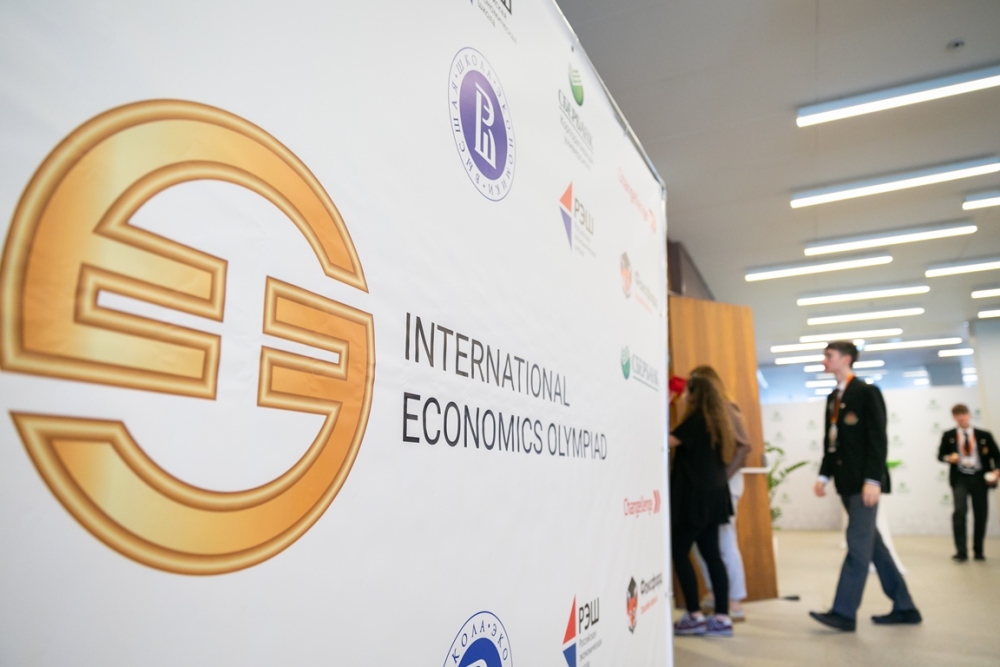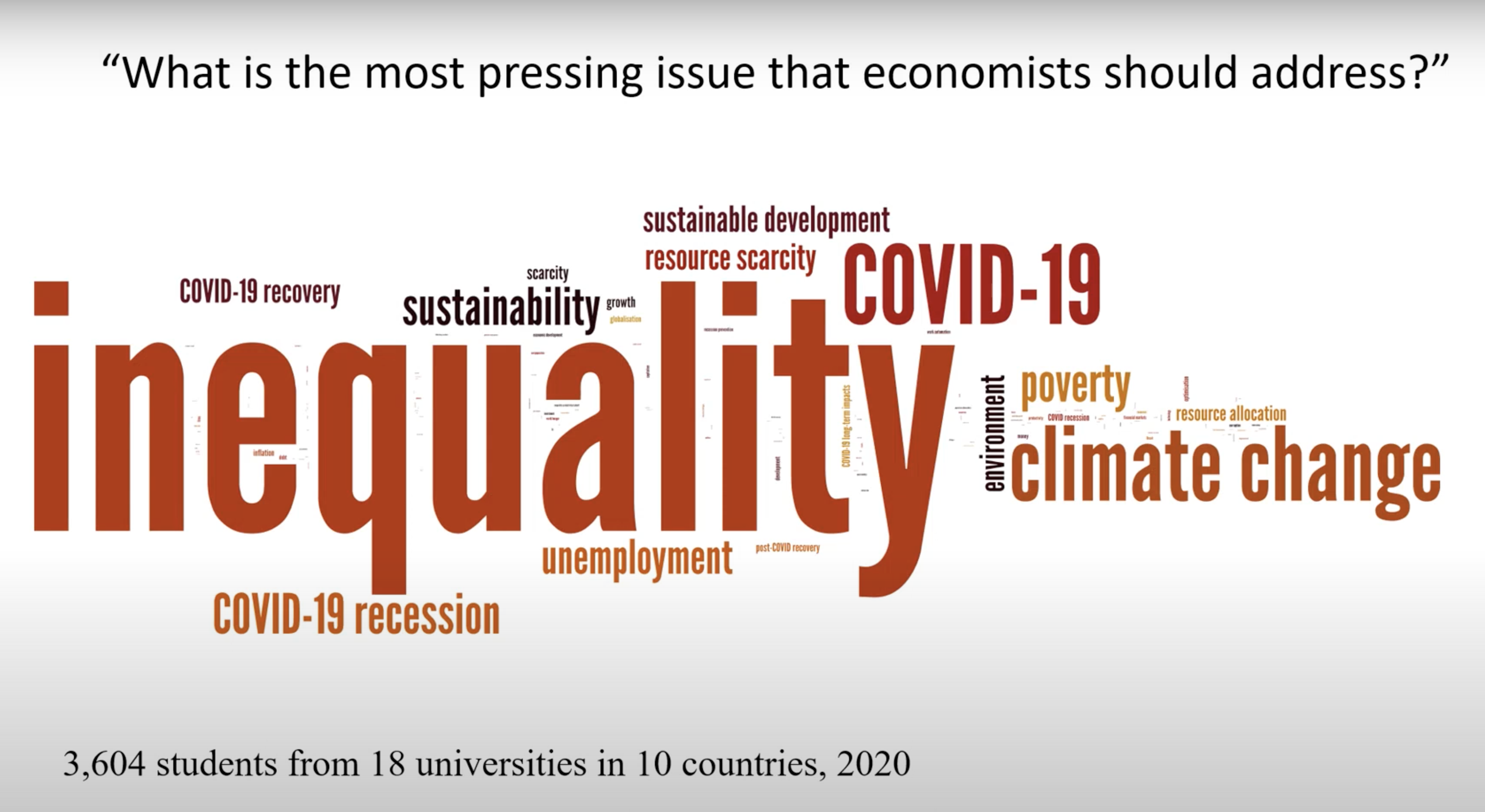‘Not Testing the Knowledge, But Testing Whether You Are Ready to Interact with Reality’

The roundtable "Teaching Economics to High School Students: Curricula, Practices, Competitions" took place as part of the XXII April International Academic Conference on Economic and Social Development. Danil Fedorovykh, Deputy Vice Rector of HSE University and the President of the Executive Board of the International Economics Olympiad (IEO), initiated the session. Alexander Zhitkovskiy, Head of the Project Laboratory for Development of Intellectual Competitions in Economics (Faculty of Economic Sciences, HSE University), was the co-moderator.

Experts from seven countries discussed several topics related to the objectives and goals of teaching economics, finance, and entrepreneurship to high school students. Speakers are actively involved in the international development of teaching economics as they are the organizers of national Olympiads in Economics, Finance and Entrepreneurship in their countries. These Olympiads are the qualifying events for the International Economics Olympiad (IEO).
The International Economics Olympiad (IEO) is an annual competition in economics organized for high school students. The olympiad aims to attract students interested in economics, business, and finance and engage them in creative problem-solving. The IEO was initiated by HSE University and first held in Moscow in 2018, becoming the first event of its kind in the world. The next Olympiad will be held from July 26 till August 1, 2021 and hosted by Latvia.
The first objective of the panel was to define the goals of teaching economics to high school students. Johannes Lindner (University Teacher College Vienna/Krems & e.e.si Austrian Ministry of Education, Science and Research) stressed that learning economics is closely related to learning attitudes. In his opinion, it helps students answer the question, "How can I contribute to society as its member and as a citizen?". Humberto Llavador (University Pompeu Fabra, Spain) emphasized that all the children, whether they are going to study economics at university or not, should be literate in Finance and possess special tools to prevent them from being manipulated. Martins Danusevics (University of Latvia) also noted that teaching economics helps children become competent decision-makers as consumers, employees, and employers and make the right choices based on their knowledge of economics.
Economics concepts or skills related to economics that every person should know by the time they finish high school (according to Humberto Llavador):
- concepts of inflation and unemployment
- ability to read graphs properly
- "intentions and incentives matter"
- "information is important"
The second important topic discussed was the methods of teaching and ways of learning in post-COVID times. Wendy Carlin, professor of University College London, shared the poll held by the CORE Project among 3,604 students from 18 universities in 10 countries. The question was, "What is the most pressing issue that economics should address?". Though inequality remains the most pressing concern, students are also concerned about the COVID-19 recession.

Professor Wendy Carlin is one of the people behind the CORE Project. As described by Danil Fedorovykh," the CORE ECON is one of the most significant things that happened to Economics education around the world during the last decade. One of the primary sources recommended to the participants of the International Economics Olympiad".
Thomas Schneiter, one of the organizers of the Swiss Economics Olympiad (which is very practice-oriented), mentioned more blended learning and breaking out of both the classrooms and the classic structure of the lessons as the main changes that the pandemic made to teaching.
The question of whether the intellectual competitions in economics should test theoretical knowledge or the way of thinking or knowing how economies work was also in the centre of attention. Danil Fedorovykh shared one more competition currently developing in Russia: the so-called "Olympiad in Practical Economics".

Danil Fedorovykh, Deputy Vice Rector
Apparently, the Russian system of olympiads and Russian system of economic education in high school are among the most advanced in the world. Still, the tasks are often too academic and theoretical. In my view, rather than testing the knowledge of theory, they should be (at least in some part) practice-oriented and test analytical skills and curiosity. That's why there are the business case and financial literacy parts in the IEO. That is also the reason why we plan to launch a new national competition in 'practical economics' in Russia.
Daniel Fonseca Lavouras from the Ministry of Science, Technology and Innovation of Brazil told about how the National Olympiad in Economics in Brazil - OBECON - is held.
In the first round, the organizers try to involve as many schoolchildren as it is possible. To do so, they use colourful advertisement materials and try to make tasks easy and understandable. The level of difficulty increases with each following round, but the same happens with the motivation of the сontestants. "The treasure of the system is the base, and if we have a strong base, we will end up having a world-class team representing us in the international competition".
Martins Danusevics pointed out that economic knowledge should not be a privilege of few and become a mandatory lesson in high school globally. According to him, Latvia is moving to the educational model where Economics is taught from the first grade as a part of social sciences. He also indicated that Latvia has a positive experience of collaboration with industry and partners outside of the educational field (e.g. Bank of Latvia).
As for the interactive tools and resources to help teachers and learners, Humberto Llavador recommended the e-book "Experiencing Economics" by CORE Project. It contains all the necessary information about how to run experiments that will contribute to a better understanding of Economics and help students by being not the receivers of information but its sources. Wendy Carlin demonstrated interactive data-based resources such as the simulator of the effect of social distancing policies on virus transmission, the economy, and income inequality or the "Our World in Data" website.
The panel discussion became an excellent opportunity to exchange global experience in teaching economics in different regions of the world. With the complete agreement of the participants, the session gave rise to a series of thematic meetings.
Alexandr Zhitkovskiy
Head, Project Laboratory for Development of Intellectual Competitions in Economics
Danil Fedorovykh
Deputy Vice Rector
See also:
‘Teaching Is a Learning Experience for Me—Every Question Is an Opportunity to Update My Lecture Material’
Kemal Kivanc Akoz is an Assistant Professor of the Department of Theoretical Economics at the Faculty of Economic Sciences. He has been at HSE University for six years and his current activities include research into marriage market dynamics and information agreements among groups of agents. In this interview with the HSE News Service, Kemal talks about the subjects of his research, the teaching approach that led to him being named one of the university’s Best Teachers, his favourite places to get a coffee in Moscow, and more.
‘I Hope You Have Entered the Economic Profession Consciously’
On November 11, 2024, the HSE Faculty of Economic Sciences hosted a celebration for Economist Day. Many of the university's partners came to congratulate HSE on the occasion. The atrium on Pokrovsky Bulvar hosted booths from VkusVill, Ozon, HeadHunter, Wildberries, and other leading companies. Students and professors participated in quizzes, spun the wheel of fortune, painted, and crafted.
HSE University Announces Call for Proposals to Attend Anniversary Yasin Conference
HSE University invites submissions of proposals with academic reports for participation in the 25th Yasin (April) International Academic Conference (YIAC). The conference programme, centred on five research themes addressing issues of economic and social development, will retain its interdisciplinary focus and welcome participation from leading scientists in Russia and around the globe. The key events of the 25th Yasin Conference will be taking place in Moscow from April 15 to 18, 2025.
Maxim Reshetnikov: ‘An Effective Open Market Economy Has Been Built in Russia’
On November 11, 2024, during Economist Day in Russia, Maxim Reshetnikov, Russian Minister of Economic Development, spoke to students of the HSE Faculty of World Economy and International Affairs about Russia’s foreign economic activities, how the country managed to withstand unprecedented sanctions pressure, and the current state of its development.
FES Announces the Winner of the Nobel Prize in Economics 2024 Prediction Contest
The HSE Faculty of Economic Sciences summarised the results of its traditional prediction contest. FES holds this contest annually on the eve of Nobel Week. This year, the contest once again attracted participants from different regions of Russia and countries around the world. Remarkably, one participant managed to predict all three laureates of the 2024 Economics Prize.
Try Your Hand at Predicting the 2024 Nobel Prize Winner in Economics
The Faculty of Economic Sciences is launching its annual prediction contest. On October 14, the Nobel Committee will announce the winners of the Sveriges Riksbank Alfred Nobel Prize in Economic Sciences live on air. You have time to prepare and explore the landscape of contemporary economic thought. What topics and areas are considered particularly important and promising at the moment? Anyone can win.
Choosing the Right Server Results in Better Outcomes in Doubles Tennis
The Roland Garros tennis tournament, one of the most prestigious in the world, began on May 26. The prize money for this year's French Open totals nearly 54 million euros, with athletes competing in both singles and doubles events. In doubles tennis, choosing the right strategy for a match is crucial. Athletes' ability to adapt to the dynamics of the match and strategically choose the server can earn the pair up to 5% more points, according to Nikolai Avkhimovich, doctoral student and research fellow at the Laboratory of Sports Studies of the HSE Faculty of Economic Sciences. A paper with the study findings has been published in Applied Economics.
Consumer Prices Decrease in Densely Populated Areas
HSE University economists have proposed a novel approach to modelling monopolistic competition with heterogeneous firms and consumers. The results of collaborative research carried out by Alexander Tarasov from Moscow, his co-authors from HSE University–St Petersburg, together with the Norwegian School of Economics, the University of Pennsylvania, and the Free University of Brussels, have been published in American Economic Journal: Microeconomics.
Football Players Cover Greater Distances During Critical Derby Matches at Home Arena
Researchers at the HSE Faculty of Economic Sciences examined the level of effort that professional football players are willing to exert during a match in absence of financial incentives. It appears that the primary factors driving players to strive harder for victory are the strength of the opponent and the significance of the match for the club. This is particularly noticeable in derby matches between teams from the same city, such as the Moscow derby between CSKA and Spartak on April 25, 2024. The study has been published in the Journal of the New Economic Association.
Participation in Crowdfunding Can Generate up to 73% in Returns Annually
Backers of projects on crowdfunding platforms can expect rewards from their pledges. For example, funding someone's idea on Kickstarter can result in an average annual return of 11.5%, with design projects known to deliver returns as high as 70%. However, it is important to note that these returns do not come in the form of direct cash payments but rather as savings on the purchase of the product once it hits the market. This has been demonstrated in a study by researchers at the HSE Faculty of Economics published in Economic Analysis Letters.


